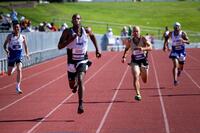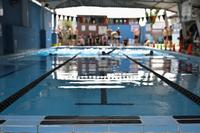If you were lucky enough to start the fitness habit when you were young, you may have wanted to bulk up for sports and found it just as hard or even harder than achieving a weight-loss goal.
Fast-forward 20 or more years into adulthood, and the same issues can occur, no matter what your fitness goals are. Fitness is hard and requires consistency. Good habits must be formed, and bad habits need to be replaced to discover optimal movement, nutrition, sleep and hydration.
The struggle is real, but if you are aware of the journey and its obstacles, you will understand that slumps, plateaus and setbacks are part of the process.
Early Teen Fitness
Maybe you have goals to make a sports team or are tired of being the skinniest kid in the neighborhood. No matter whether the goal is athletics, weight gain or weight loss, the early teen usually sees quick progress with performance.
For the young goal-oriented teen who wants to get bigger muscles and play sports, start off with the basics of calisthenics and dumbbell (or TRX) resistance training. If you're aiming to play a sport that uses balls, also work on speed and agility. If you're looking to participate in running, swimming or rowing, work on longer-duration endurance.
A combination of cardio options is fine for the multi-sport, goal-oriented teen if they're balanced through the week. You may have trouble adding training time between sport seasons, practices and school.
Beginning this journey may require only 2-3 days a week of training, especially if you are having practices several times a week as well. The good news is that a teen's recovery is generally much quicker, but you can overdo it if you are not careful.
Many teens will neglect to focus on their sleep, nutrition and hydration. If you want to gain weight, it will require much more food intake than you realize. You typically need an extra 500 calories every day of the week just to come close to gaining one pound.
You must exercise, or that weight gain won't help you in athletics. You do not get stronger, faster and bigger by only increasing your activity. You will not see improvements unless you are recovering enough to grow and avoid burnout and overtraining.
Teen Fitness Weight Loss
Weight loss for a teen is much easier than for an adult. As adults, we typically become "hard losers'' and are no longer in the "hard gainer" phase, meaning it is easy to gain weight but hard to lose weight.
Learning how to eat healthier food and consume less junk food and sugary drinks has to be a part of this journey. Adding movement to your day will allow you to see huge results quickly. My advice is to replace all sugar drinks with water and start walking. As you lose weight, calisthenics and running will become an easier activity; the next thing you know, you will be in the zone you want to be.
Fitness Goals as We Age
The habits that helped you build a fit body as a teen will help you the rest of your life if you do not build bad habits and replace exercise with a sedentary activity. That's the mistake most people make.
People who were hard gainers as teens will continue to eat the way they did to gain weight, achieve that goal and continue to gain weight -- only to find themselves overweight sometime around 30 to 40 years old.
You must learn to eat differently as you age. You will find that you no longer can outwork your poor diet choices. There is no reason why you cannot enjoy competitions in team sports, recreation leagues and racing (bike, run, swim, obstacle courses, etc.). All are great activities that can give the goal-minded athlete a reason to train.
Maintaining old personal records for PT tests, run times, swim times and weightlifting can be classic fitness goals for many active-duty and retired military who have maintained the fitness habit as they aged.
If you spent a few decades focused on family and career (quite common) and let your fitness lapse, that is OK. The answer is to start over again and treat yourself like a beginner.
Not unlike when you first started training as a teen, take baby steps and focus on walking or biking and calisthenics as a healthful way to start the journey.
The last thing you want to do is pull out the old workouts you did in your prime 20 years ago. That is asking for pain and injury and will lead to setbacks and failure.
If you need to get moving again, here are my top three suggestions:
1. Start with non-impact cardio activity. Your knees, shins, feet, back and joints will thank you for not running at the beginning, especially if you are overweight.
2. Add resistance training to build your muscles. I like to do calisthenics or lift dumbbells first, then finish the workout with non-impact cardio.
Don't just diet and do cardio. Adding resistance training through circuit training, calisthenics or TRX exercises will be most helpful as you begin to lose weight and start to improve your fitness.
3. Eat better. Limit extra sugars. Eat more raw fruits and vegetables for carbs and grilled or baked lean meats for protein (chicken, turkey, beef, fish). Avoid fried foods. Drink a lot of water. Drop the sugar for best results.
No matter who you are, you can make this happen and start driving toward your health and fitness goals.
The next thing you know, your confidence grows and the newfound training and nutrition discipline will spill over to other areas of your life, including work, school, sports, family and relationships.
Stew Smith is a former Navy SEAL and fitness author certified as a Strength and Conditioning Specialist (CSCS) with the National Strength and Conditioning Association. Visit his Fitness eBook store if you're looking to start a workout program to create a healthy lifestyle. Send your fitness questions to stew@stewsmith.com.
Want to Learn More About Military Life?
Whether you're thinking of joining the military, looking for fitness and basic training tips, or keeping up with military life and benefits, Military.com has you covered. Subscribe to Military.com to have military news, updates and resources delivered directly to your inbox.


















